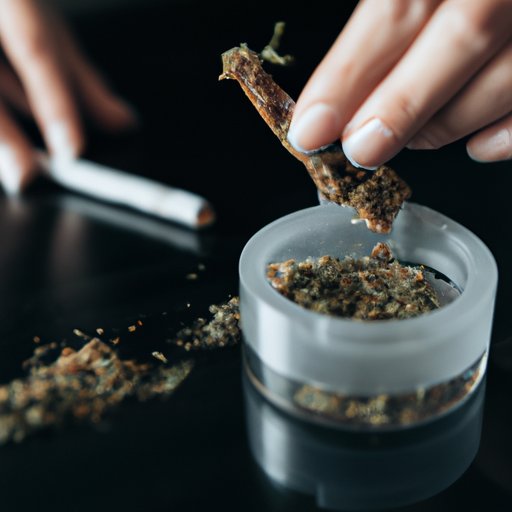Introduction
Smoking weed, or marijuana, has become increasingly common in recent years and is often viewed as a harmless habit. However, long-term use can lead to dependence and negatively impact one’s mental and physical health. Quitting can be challenging, but it is possible. This article aims to provide readers with tips and resources to help them quit smoking weed and lead a healthier life.
5 Proven Tips to Help You Finally Quit Smoking Weed for a Healthier Life
There are different methods people use to quit smoking weed, but the two most common are weaning off gradually and going cold turkey. Gradual tapering can be beneficial for individuals who have developed a dependence on marijuana and are not able to quit abruptly. However, there is a risk of relapse during this method. Going cold turkey is an effective and quicker approach, but it can be challenging to cope with withdrawal symptoms.
It is important to understand the advantages and disadvantages of each method and choose the one that works best for you. Besides, here are some tips you can follow to help successfully quit and stay sober:
- Set a quit date and stick to it. This gives you a clear goal to work towards and helps you mentally prepare for the challenge.
- Avoid triggers that may entice you to smoke, such as hanging out with friends who smoke or going to places where people smoke.
- Find alternative ways to destress and relax that do not involve smoking weed, such as taking a walk, listening to music, doing yoga, or taking a warm bath.
- Join a support group or seek the help of a counselor who specializes in addiction and can help you navigate the emotional aspects of quitting smoking weed.
- Reward yourself for your progress. Quitting smoking weed is a significant achievement, and acknowledging your efforts can boost your motivation and confidence to continue on your journey.
Breaking Up with Mary Jane: How to Overcome Your Dependence on Weed
Breaking up with Mary Jane, or weeding yourself off marijuana requires more than physical willpower. The psychological and emotional aspects of addiction are often overlooked, but they play a crucial role in quitting smoking weed. Here are some tips on how to overcome your dependence on weed:
- Develop a positive mindset. Focus on the benefits of quitting, such as better mental and physical health, saving money, and gaining more control over your life.
- Seek support from loved ones who understand your struggles and can offer emotional support.
- Attend counseling or support group sessions, which are an excellent resource for individuals recovering from addiction.
- Practice mindfulness techniques, such as meditation or deep breathing exercises, to alleviate anxiety and stress.
5 Natural Ways to Cope With Marijuana Withdrawal
Once an individual quits smoking weed, they may experience withdrawal symptoms such as anxiety, insomnia, irritability, and depression. Here are five natural ways to cope with marijuana withdrawal:
- Exercise. Regular physical activity releases feel-good endorphins in the brain, reducing symptoms of anxiety and depression.
- Practice meditation or other relaxation techniques, such as deep breathing or yoga.
- Maintain a healthy eating habit, including drinking plenty of water and consuming fresh fruits and vegetables, lean protein, and healthy fats.
- Try herbal remedies such as lavender or chamomile tea, which can promote relaxation and reduce anxiety.
- Engage in creative activities such as writing, painting, or playing music as a distraction and a way to process emotions.
It is essential to remember that withdrawal symptoms are temporary and will subside with time.
The Health Risks of Smoking Weed: What You Need to Know Before Quitting
Smoking weed can negatively affect one’s physical health. It risks issues ranging from respiratory problems, memory impairment to decreased motivation. Quitting smoking weed brings many benefits, including:
- Reduced risk of respiratory problems
- Improved cognitive function and memory
- Better mental health and reduced anxiety and depression symptoms
- Financial benefits that arise from saving money spent on purchasing Marijuana
Research shows that quitting smoking weed can lead to significant improvements in one’s mental and physical health.
Rebuilding Your Life After Quitting Smoking Weed: A Comprehensive Guide
Quitting smoking weed can feel like starting over, but it is an opportunity for individuals to reclaim their lives and mental health. Here are some tips on how to rebuild your life after quitting smoking weed:
- Find new hobbies and interests that can occupy your time and focus your energy. For instance, engaging in physical activities or socializing with soberists.
- Build a support network. This involves reaching out to friends and family who understand your journey or joining a support group.
- Practice healthy habits such as eating healthy, getting enough sleep, and participating in regular exercise.
You may feel overwhelmed in the early days of quitting. Therefore, it is crucial to remember that healing is a process and to take it one day at a time. Small steps can go a long way towards rebuilding your life and mental health.
Conclusion
Quitting Smoking weed requires a great deal of dedication, courage, and resilience. As outlined in this article, there are different methods to quit smoking, with each contributing to the journey of becoming sober. It’s also important to focus on the benefits of quitting smoking weed and finding alternative ways to cope with withdrawal symptoms. Staying motivated to lead a healthier life is possible through self-reward, support, and positive growth with new hobbies and interests. A support group and counseling can assist in overcoming those who struggle to quit smoking weed. The journey may be challenging, but it is achievable, leading to a healthier life in the long run.
If you or someone you know is struggling with addiction and looking to quit smoking weed, there are many resources available to help. Reach out to a counselor or support group today to begin the journey towards sobriety.
